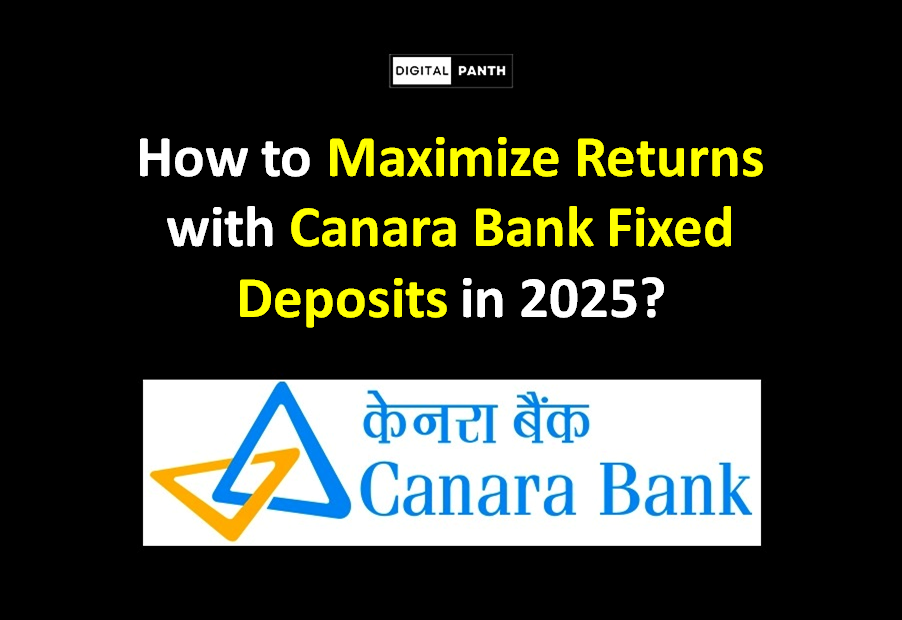In 2025, to maximize returns through Canara Bank Fixed Deposits, one might consider opening a Kamadhenu Deposit, go for longer tenure deposits, or watch for interest rate fluctuations scrupulously.
Canara Bank Fixed Deposits can be considered a good investment in 2025 for people looking for security, stability, and assured returns in rather unstable times. With interest rates that competently challenge other banks, government security deposits, and flexible tenure options, Canara Bank FDs certainly mark their territory as an excellent opportunity for keen investors, whether conservative or strategic.
This blog intends to take readers through some of the best strategies to maximize FD returns; choosing the right tenures, understanding how interest rate cycles impact investment, and exploiting tax-saving opportunities through Section 80C.
Key Strategies for Maximizing Returns:
Kamadhenu Deposit: By going for deposit, one can choose compound interest reinvestment plans like the Kamadhenu Deposit, wherein interest is compounded and reinvested with the principal amount. This leads to a heavier accumulation over time.
Prefer Longer Tenures: You can consider long tenures as it offer higher rates in FDs. So, the banks pay more for the extended hold on money by them. This is best suited for those with long-term financial goals.
Employ FD Laddering for Balance & Liquidity: Spread your investment into a series of FDs. Such an arrangement guarantees periodic availability of funds and allows reinvestments at attractive interest rates.
Auto-Renewal Facility: With the auto-renewal facility, you save time and ensure continuous investment growth without manual filling. The renewals carry on at prevailing FD rates, so your cash does not remain idle!
Senior Citizen Rates: If you are 60 years and above, you will get an extra 0.50% interest on the FD, which pushes your total interest income to a large extent. The reinvestment schemes benefits becomes greater for user with senior citizen interest rates.
Analyze Payout Options: Canara Bank offers monthly and quarterly interest payouts for a steady flow of income. Alternatively, you may select interest payout only on maturity to maximise compound returns.
Watch for Rate Fluctuations: The listed interest rates keep changing with the RBI policy and market conditions. Always stay informed, and reinvest with measures when interest rates are high.
Tax Planning & Deductions – Maximizing Post-Tax Returns on Canara Bank FDs.
Investment in fixed deposits is considered as the safest way to accumulate funds. However, the returns can be severely diminished if taxes are levied directly. Here’s a smarter tax planning approach for your Canara Bank FD investment for the year 2025:
TDS deductions on FD Interest Income
As per Income Tax rules, TDS is deducted if the interest earn in FDs crosses the limit of ₹40,000 for any financial year.The FD limit is set at ₹50,000 for senior citizens. Consequently, Canara Bank will deduct 10% TDS on interest income above these limits against your PAN. Without PAN, TDS is deducted at 20%.
For example: Interest income of Rs. 55,000 has TDS deducted on Rs. 15,000 (Rs. 55,000 – Rs. 40,000) at 10%, totaling Rs. 1,500, for individuals under 60.
Submission of Form 15G/15H to Avoid TDS
You can ensure TDS is not deducted by submitting 15G or 15H self-declaration forms at the start of any year.
Form 15G: It is meant for persons below the age of 60, having total income below the taxable threshold.
Form 15H: It is issued for Senior Citizens (60+) having a total income below the exempt return.
These forms should be submitted to Canara Bank for each FD (or branch where FDs are held) physically or digitally through Canara Net Banking.
Remember: Misuse may bring penalties under Section 277 of the Income Tax Act.
Tax-Saving Five-Year FD Under Section 80C.
- Tax-saving FD could be a way to lessen the burden of tax outgo:
- Minimum lock-in period: Five years with no premature withdrawal.
- Only FDs worth more than ₹1.5 lakh qualify for deduction under Section 80C.
- Open to individual and Hindu Undivided Family (HUF) investors.
- Only individual accounts (single or jointly held) are eligible.
- Joint accounts are only eligible for tax benefits for the first holder.Note: Interest earned on the investment is fully taxable, while the principal amount invested is deductible under Section 80C.
Tips to Minimize Tax Burden on FD Returns.
To minimize the tax burden, some of the ideas are mentioned below:
Get Family Members to Open FDS – If family members below the tax slab are eligible for this, it may be beneficial to income.
Plan the Tenure for Some Period to Span Financial Years – If your FD matures over two financial years, interest payout may get split across the years, reducing annual taxable interest.
Open FDs in the Name of a Senior Citizen: FDs in the names of senior citizens (a parent, spouse, etc.) may avail exemption up to ₹50,000.
Use Tax Planning Instruments Together – Combine FD investments with ELSS, PPF, and life insurance; so that you stay within the ₹1.5 lakh limit under Section 80C, optimizing your deductions.
Use the Reinvestment Option – Interest payment can be deferred by opting for cumulative FDS. You should remember that the interest will be liable only when it accrues or is credited.
By selecting the appropriate tenure, utilizing tax-saving options, and remaining vigilant to market changes, you can maximize your Canara Bank FDs in 2025. Consult your financial advisor or visit the nearest branch to get started today.
Disclaimer:
The article suggests information only and does not act as financial, tax, or investment advice. The reader should preferably refer to a competent financial adviser or tax consultant before making any investment decisions. The strategies discussed are based on general financial principles and may not be suitable for all individuals. We are not affiliated with Canara Bank or any of its subsidiaries. All mentioned financial products, including Fixed Deposits and tax-saving instruments, are subject to market scenario, regulatory changes, and eligibility for the concerned parties. Any use of this information shall be at the reader’s risk and discretion.

